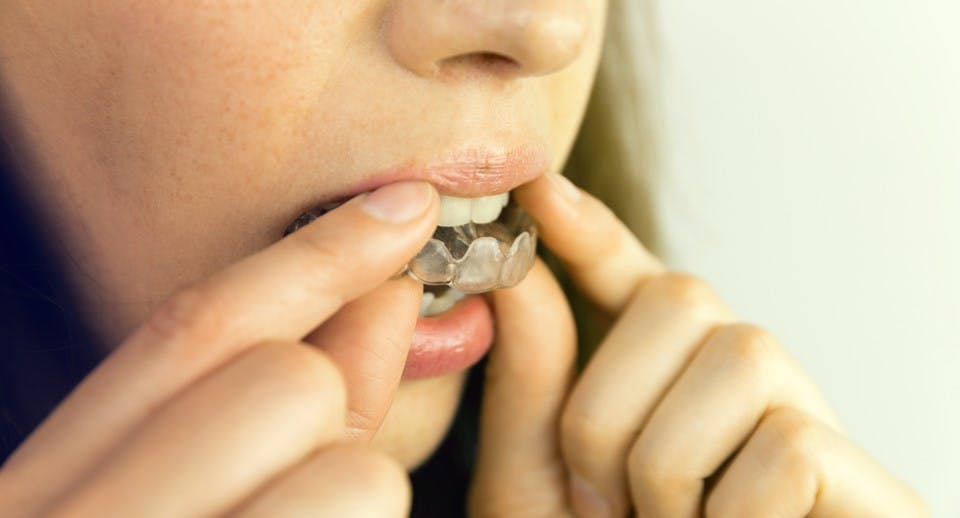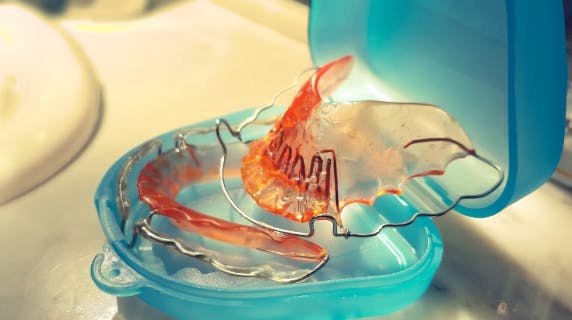Comparing Dental Retainers
If you’re new to the world of removable dental appliances, like many people, you may be wondering: is there a difference between mouth guards, retainers and aligners? While there may be similarities, there are also important key differences. The one which is right for you will depend on your individual needs and the advice you have been given by your dental professional.
What is an aligner?
Aligners are used as part of orthodontic treatment and are used for aligning the teeth. They may look a lot like retainers, but are precision molded to meet the technical demands of moving your teeth.
How does an aligner work?
Aligners are designed to apply just the right amount of pressure in just the right places to coax your teeth into a new position during orthodontic treatment. Each new set will be molded slightly differently to the last and you’ll be given a new aligner set every 1-2 weeks. It’s important to wear these as advised. Aligners can be worn for large parts of the day and removed for specific occasions, such as cleaning and eating. Step by step, as you progress through your treatment your teeth will be moved gradually to their final positions. Once in place, you’ll need to wear a retainer to keep them there.
What is a retainer?
Retainers are designed to keep your teeth in position following orthodontic treatment. Once your teeth have been moved to their final position at the end of treatment, it will take time for the surrounding gum and bone to adjust to the new position. To be effective, retainers need to be worn in accordance with your dentist's advice. After that, it may be possible to just wear them in the evenings and while you sleep. You can learn more about the different types of retainers here.
How does a retainer work?
Retainers are precision molded to fit the individual positions of your teeth. Like a tailor fits a suit, each retainer is made and fitted to you. They’re designed to keep your teeth from moving and hold them in place. They may feel a little uncomfortable or strange at first, but by wearing them regularly and following your dentist's advice, this feeling should improve in a few weeks as your teeth settle.
Why should I use a retainer?
Retainers are a good way to protect your investment in your smile. Worn regularly, they keep your teeth in place. However, if you fall out of the habit of wearing them, your teeth may move. You may not notice these changes at first and the first clue that your teeth have moved could be that your retainer feels a bit tight when you try wearing it again. Unfortunately, if your teeth have moved please do not try to force-fit your retainer. If you’re having trouble refitting your retainer, talk to your dental professional.
How should I take care of a retainer or an aligner?
It’s important to care for your retainer or aligner. Cracked or broken retainers or aligners may not hold your teeth in place and should be replaced by your dentist. Be careful to avoid heat as this may deform the plastic in your retainer. It is also important to clean them regularly as plaque bacteria can quickly build up and may lead to bad breath or other problems. Learn more about the relationship between retainers, aligners and plaque bacteria here.
What is a mouth guard?
At first glance a mouth guard might look like a retainer, but they are actually very different. Mouth guards are meant to fit over your teeth to help prevent issues related to bruxism (teeth grinding). Night guards are custom fitted by your dental professional.
How does a mouth guard work?
If you grind your teeth at night (or bruxism to give it its medical name), you may have been recommended to wear a mouth guard. Their main purpose is to protect your teeth by providing a barrier between your upper and lower teeth. At their most basic level, are guards that you place over your upper and/or lower teeth when you go to sleep. Depending on how severely you grind your teeth, you may be advised to wear a guard made of harder plastic. These are designed to offer better protection for your teeth and may also last longer.
Why should I use a mouth guard?
While there are many reasons why people grind their teeth, such as anxiety, sleep disorders, the potential harm to your teeth is the same. You may not even be aware you’re doing it, but the constant grinding wears down your teeth, causing your enamel to wear down, and potentially exposing more vulnerable parts of your teeth or weakening them. Mouth guards provide the protection your teeth need and may also help relieve some of the other symptoms.
How should I care for a mouth guard?
Just like retainers, it’s important to care for your mouth guard on a daily basis. Regular cleaning will reduce plaque bacteria build up that can cause bad breath and discoloration.
Using a professional removable dental appliance solution like Polident ProGuard & Retainer Cleanser can be a convenient and easy way to help ensure your retainer, aligner or mouth guard is clean.* These dissolvable tablets are gentle enough for daily use and specially designed with Crystal Clear technology to lift stains and effectively clean and freshen, and are proven to kill 99.99% of odor-causing bacteria in just 3 minutes.**
* When used daily, as directed
*Always follow the instructions on the package.
**In laboratory tests
So now that you know the difference between mouth guards, aligners and retainers, you can consult with your dentist to determine the right choice for you.






